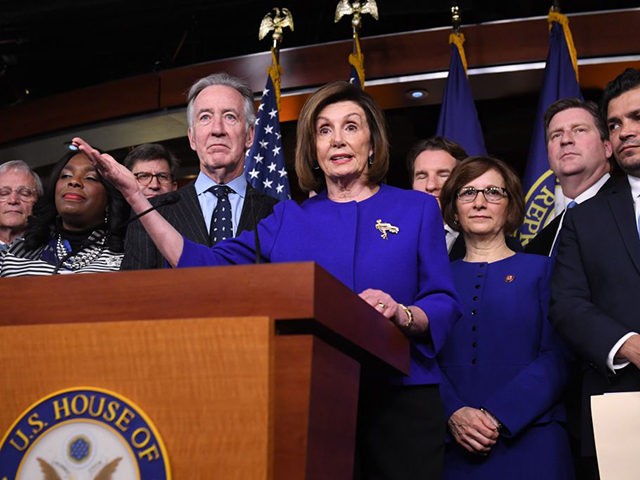House Speaker Nancy Pelosi (D-CA) said during a press conference Tuesday that she “lost” her fight to remove a provision granting big tech companies expanded immunity in the United States-Mexico-Canada Agreement (USMCA). Sen. Ted Cruz (R-TX) and Rep. Paul Gosar (R-AZ) told Breitbart News that they still have significant reservations over the immunity’s inclusion in the trade deal.
Breitbart News reported last week that Pelosi expressed concern over the USMCA inclusion of language that is even broader than Section 230 of the Communications Decency Act. The provision, Article 19.17, would grant greater legal immunity for big tech companies to censor, or moderate, any content compared to Section 230 of the Communications Decency Act.
During a press conference on Tuesday, Pelosi announced their compromise with the United States Trade Representative (USTR) Robert Lighthizer on the USMCA, admitting that the big tech provision will remain in the trade agreement.
Pelosi said that Article 19.17 would limit Congress’s ability to change telecommunications law, especially when it would involve big tech companies’ legal immunity over content moderation. The California Democrat said that Article 19.17 is a “real gift” to big tech companies.
Pelosi said that Article 19.17 would “hurt our own ability to make our own laws in the United States, and those countries to do so, I have one disappointment which was … Section 230, which I was too late coming in on it.”
“I lost. Here’s the thing: They had 230 in the agreement; there are some members that … it’s a real gift to big tech,” Pelosi said.
The USMCA’s inclusion has engendered bipartisan criticism, reaching from Cruz to Rep. Linda Sanchez (D-CA).
Rep. Jan Schakowsky (D-IL) said during a hearing in October that “there is no place” to include language granting big tech companies legal immunity in the USMCA or the U.S.-Japan trade agreement.
Schakowsky described the inclusion of Article 19.17 as a “gift to big tech.”
“It is a uniquely American law, and we’re in the midst of a discussion about it, and this is a gift to big tech to insert it into trade agreements,” she charged.
Cruz said in a statement to Breitbart News that while he believes that the USMCA will help American workers, he remains disappointed that the deal contains the “Section 230 language.”
Cruz said Tuesday:
I haven’t seen the text of the deal, but I hope it’s a good deal that protects our workers and creates more jobs for Texans. I’m disappointed to learn that Section 230 language is still in the trade deal — especially when lawmakers across the political spectrum express serious concerns. I’ve long said that enshrining Section 230’s grant of immunity to Big Tech in our trade agreements would be a mistake, and I will continue to examine ways to hold Big Tech accountable — both legislatively and in our trade deals.
Gosar, who originally sounded the alarm over Article 19.17 in May, said that the trade deal is a “huge victory” for the country, but he still has “deep reservations” over the big tech provision.
Gosar told Breitbart News in a comment, “The USMCA is a huge victory for the American people, only made possible by the leadership of President Trump. Arizona’s farmers, ranchers, manufacturers, and small businesses will reap the benefits of this new trade deal for years to come. While the USMCA is a net positive for the American economy, I still have deep reservations about including a provision that protects Big Tech’s unprecedented immunity under Section 230 of the Communications Decency Act. This provision facilitates unwarranted censorship, harms fair competition and creates severe consumer risks allowing online retailers like Amazon legal immunity for selling defective, fake, and banned products.”
Both chambers of Congress, both Republicans and Democrats, have taken an ever-increasing interest in amending Section 230 to increase the liability for Internet platforms that host sex trafficking or unfairly censor political speech.
However, as both Cruz and Pelosi have explained, the USMCA’s Article 19.17 could serve as a hurdle for Congress to amend the telecommunications law, which could force the legislative branch to potentially breach the treaty should it decide to amend tech companies’ legal immunity.
Cruz said that “enshrining” big tech’s legal immunity could force lawmakers to “either abandon efforts to hold big tech companies accountable, or revise Section 230 and put the United States in breach.”
Sean Moran is a congressional reporter for Breitbart News. Follow him on Twitter @SeanMoran3.

COMMENTS
Please let us know if you're having issues with commenting.